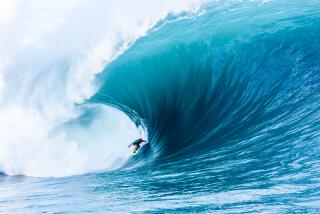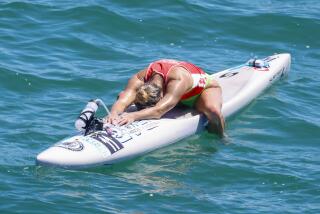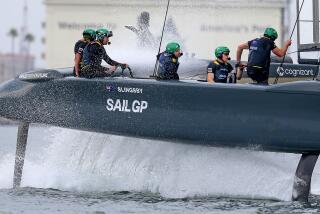On-Water Judging Will Be Used at Long Beach
- Share via
Competitive sailing has always had a ritualistic method of enforcing its rules: a protest hearing followed by a death penalty.
Most sailors who have endured the process--even some who have won--would rather have a root canal than go through this nautical reenactment of the Spanish Inquisition.
When non-sailors were exposed to the America’s Cup a year ago, they started asking sailors why their sport can’t make on-the-spot judgment calls, as other sports do. That set some of them to thinking: Why not, indeed?
It makes little sense that it should take hours to determine a winner and that the only penalty for any foul, from a major collision to merely forcing a boat with right of way to alter course, is disqualification.
The leaders of Long Beach Yacht Club’s 24th Congressional Cup match-racing series next week agree. Theirs will be the second major event to feature on-the-water judging, following an initial experiment in the Maxi Worlds at Newport, R.I., last year.
Two judges in a power boat will watch each match around the course. They will initiate no judgments, but when one boat raises a red protest flag they will render a ruling within seconds, and the offending boat will be obliged to momentarily lower its headsail, costing it a few boat lengths but not necessarily the race.
The system will be faster than the National Football League’s instant replay and probably more satisfactory to the sailors, with one possible exception.
He is Peter Gilmour, who while sailing for the Australian Kookaburra team in the America’s Cup at Fremantle was involved in more protests than anyone else, filing 17 but winning only 3. How will the new system affect his style?
“It will ruffle him a fair bit,” said Rod Davis, a two-time Congressional winner. “He can’t get in (the protest hearing room) and plead his case.”
Davis, who now lives in New Zealand and works with Michael Fay’s America’s Cup team, has been up against Gilmour on the water and in the hearing room.
“He’s very good at collecting evidence,” Davis said by phone from Auckland. “He’ll still use the same aggressive style, but he won’t be able to turn things over in the room anymore.”
And in case anyone decides to take more chances, considering that the penalty is so light, the judges also have the authority to penalize a competitor for filing a frivolous protest.
Davis was invited to compete in the Congressional again. He planned to bring a full New Zealand crew but then changed his mind because of a conflict with the launching of Fay’s superboat.
Davis, who skippered Eagle for the Newport Harbor Yacht Club, has been living in New Zealand since the America’s Cup. His wife Liz is a native Kiwi. Davis, who grew up in Coronado, across the bay from San Diego, sees no serious conflict in helping New Zealand against the San Diego Yacht Club, of which he is still a member.
“Just because you grow up in San Diego doesn’t mean you have to play for the Chargers,” he said.
As sailing master, Davis is in charge of selecting and training the 40-man crew but can’t be on the boat. America’s Cup rules require that all those on board have been a resident of the country it represents for two years before the event.
However, if the event is postponed from September until the spring of ‘89, as Fay now proposes, Davis could qualify.
More to Read
Go beyond the scoreboard
Get the latest on L.A.'s teams in the daily Sports Report newsletter.
You may occasionally receive promotional content from the Los Angeles Times.










